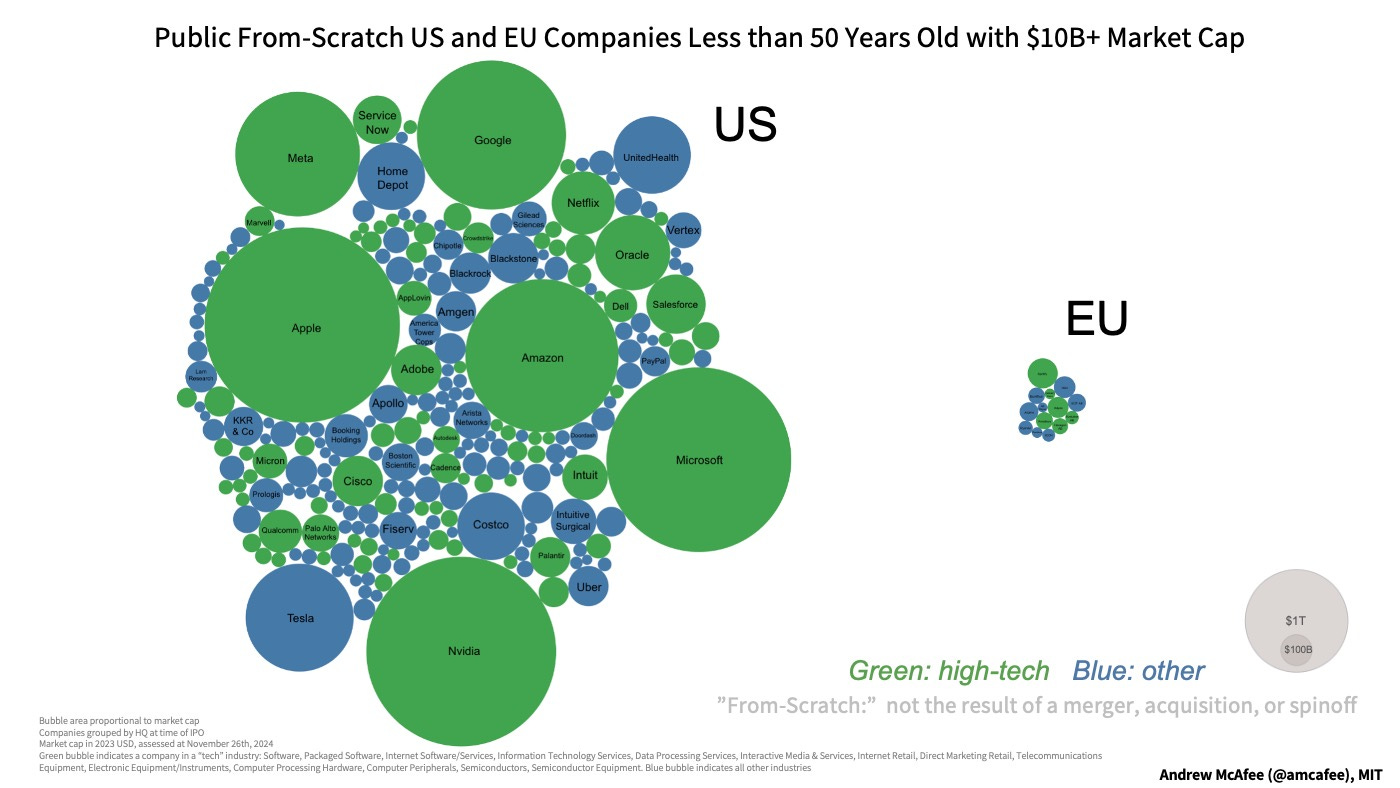ZD 24.39: A Wild Week in the World
Some weeks big things happen. This is one of them.
In this issue: Sophie Rain’s OF, the battery baron, Newton v Marcus, La Sombrita recovery, Trump tariff possibility funnel, inspiration on re-industrialization and a wrapper on a crazy week.
The Distilled Spirit
🤑 $43m on OF? (Future Proof)
Sophie Rain claims she earned $43 million in 2024 through softcore porn on OnlyFans. Her success isn’t just about charging for explicit content; it’s rooted in her ability to cultivate parasocial relationships with countless men. By creating a sense of intimacy and exclusivity, she makes her audience feel like she’s part of their lives. This phenomenon isn’t unique to OnlyFans or its users—YouTubers and Substack writers leverage similar dynamics, albeit often at a smaller scale.
🔋 The Battery Baron (Interconnected)
Ningde, China, is home to CATL, the world’s largest power battery manufacturer, and the brainchild of Robin Zeng—an Elon Musk-like visionary. Born in Ningde, then a small farming village, Zeng first rose to prominence by producing the battery for Apple’s iPod through his first company, ATL. After selling ATL to TDK, Zeng waited for the right moment to strike again. When China began subsidizing decarbonization, he seized the opportunity, founding CATL and crafting a distinctive structure to dominate the global battery industry.
🤖 Newton v Marcus
Casey Newton attended an AI-skeptical conference and write an AI-positive piece calling out Gary Marcus. A few days later, Gary Marcus responded in kind largely eviscerating Newton’s piece. I suspect the truth is somewhere in the middle but both pieces are good illustrations of the AI-positive and AI-skeptic ends of the debate and are worth study.
👷♀️ Recovering from La Sombrita Era (The Transit Guy)
Los Angeles recently unveiled "La Sombrita," a bus shelter top that provides neither power nor light—despite years of effort, involvement from ten departments, four commissions, and endless red tape. It stands as a stark allegory for the dysfunction plaguing many cities. In response, The Transit Guy offers ten common-sense principles to cut through the bureaucracy and restore sanity to urban planning.
🚢 Trump Tariff Possibilities Primer (Chartbook)
Adam Tooze delivers a brilliant primer on the stakes involved and the ways in which Trump could impose tariffs on China and other U.S. trading partners. He outlines the mechanisms through which these tariffs could emerge, their potential scale, and the stakeholders likely to push back. While the actions of the incoming administration remain uncertain, Tooze’s analysis provides valuable insight into the range of possibilities.
🏭 Bootstrapping Re-Industrialization (Jim Belosic on X)
A guide on how one can “show young entrepreneurs that manufacturing is actually really fun (Factorio in real life), and it doesn’t require 20 years of experience (due to modern equipment and software) we’ll reindustrialize from the ground up, 2,500 square feet at a time.” Sounds much more fun than office work, where can I sign up?
A Wild and World-Historical Week
While Washington experienced another uneventful lame-duck week, the rest of the world witnessed history in the making.
On December 3, South Korean President Yoon Suk Yeol attempted a self-coup with little justification. Fortunately, it lasted only six hours. Sarah Jeong of The Verge was in Seoul and documented the events firsthand. Though the coup failed, South Korea's governmental crisis persists, with impeachment efforts so far unsuccessful.
On December 6, Romanian courts nullified their presidential election after discovering Russian interference that boosted pro-Russian ultranationalist Călin Georgescu in the first round. Though new presidential elections have been ordered, the far right's gains in parliamentary elections will remain unchallenged. The Institute for the Study of War has published a detailed analysis examining the events and potential consequences if Russia succeeds in undermining Romanian EU support. The lack of a scheduled election date has only heightened tensions.
Meanwhile, the Syrian regime collapsed. For a full but brief explainer see Thomas Puyeo’s visual essay for a complete rundown. The short version is Russia, struggling with economic problems and the war in Ukraine, was unable to support Assad. Anticipating the inevitable, Russia evacuated its naval base. Throughout the week, Syrian defense forces crumbled as rebels captured city after city. On December 8, as rebels approached Damascus, Bashar Assad fled the country, ending the Baath Party's 61-year rule in Syria. The future remains uncertain as people begin to pick through the rubble of the police state looking for loved ones.
One can't help but wonder whether World War III has already begun.
The Look
The difference between wealth creation in the US and the EU is stark. Via Andrew McAfee, MIT scientist and author of The Geek Way.

Did you enjoy reading this post? Hit the ♥ button above or below because it helps more people discover great Substacks like this one and it helps train your algorithm to get you more posts you like. Please share here or in your networks to help us grow!



